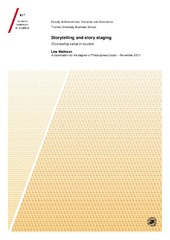Blar i forfatter "Mathisen, Line"
-
Cross-cultural co-creation of a tourist site: the emic and etic makings
Lee, Young-Sook; Mathisen, Line; Søreng, Siri Ulfsdatter (Chapter; Bokkapittel, 2023-10-17)This chapter discusses how an Arctic destination, North Cape, is co-created through time and space aided by tourists' engagement. We present two cases: (1) Thai visitors to the North Cape; and (2) North Cape as a brand in South Korea, drawing on qualitative methods. We argue that cross-cultural co-creation in tourism experiences depends on the knowledge of different emic and etic perceptions of the ... -
Lokal tilpasning av et måleverktøy for butikk-kvalitet i Tromsø
Mathisen, Line (Master thesis; Mastergradsoppgave, 2008-06)Målinger av service kvalitet, eller butikk-kvalitet, har vært mye diskutert fordi det ikke er utviklet et globalt måleverktøy som ivaretar de ulike egenskaper og faktorer ved å handel i butikk. Et av de mest kjente og mye omtalte måleverktøy, for målinger av service kvalitet, er SERVQUAL. SERVQUAL har vist seg problematisk å bruke som et globalt måleverktøy, men er den ofte brukt ved utvikling av ... -
The nature of entrepreneurs’ engagement with a layered rural context
Jørgensen, Eva Jenny B.; Mathisen, Line (Journal article; Tidsskriftartikkel; Peer reviewed, 2023-01-22)Rural entrepreneurship has recently been reconceptualised as engagement with contexts. However, our knowledge of the nature of this engagement remains limited. In this paper, we explore the engagement of entrepreneurs hired as part-time industry mentors at regional universities. Using a qualitative approach based on grounded theory and self-ethnography, we interviewed five entrepreneurs in adjunct ... -
The reciprocity of soil, soul and society: the heart of developing regenerative tourism activities
Mathisen, Line; Søreng, Siri Ulfsdatter; Lyrek, Trine (Journal article; Tidsskriftartikkel; Peer reviewed, 2022-06-15)Purpose – The study aims to investigate how tourism actors’ methodologies fuel the development of regenerative activities anchored in the reciprocity of nature and humans directed at bringing well-being for all living beings.<p> <p>Design/methodology/approach – To shed light on micro-scale regenerative creation processes in tourism, the authors engage in co-creative case study research with the ... -
The significance of knowledge readiness for co-creation in university industry collaborations
Mathisen, Line; Jørgensen, Eva Jenny Benedikte (Journal article; Tidsskriftartikkel; Peer reviewed, 2021-02-10)This study explores value co-creation in university industry collaborations. The study is inspired by the constructivist approach to grounded theory and self-ethnography and based on interviews with 27 informants (eleven industry mentors and 16 academics) engaged in university industry collaborations. The findings suggest that co-creation depends on knowledge readiness and knowledge readiness develops ... -
Storytelling and story staging. Co-creating value in tourism.
Mathisen, Line (Doctoral thesis; Doktorgradsavhandling, 2014-04-01)This thesis is about tourism firms as co-creators of value in tourist activities. It will explore how tourism firms communicate, particularly by using storytelling, to enhance co-creation of value with tourists. A central perspective used in this thesis is Service Dominant Logic, a logic that posits that service providers can only co-create value with their customer, not for them (Vargo and Lush ... -
Unfinished indigenous geographies: The endurances and becomings of a Sámi tourism venture
Granås, Brynhild; Mathisen, Line (Journal article; Tidsskriftartikkel; Peer reviewed, 2022-06-28)For many years, and within the context of pre-pandemic tourism growth in the Norwegian Arctic, governmental institutions have had expectations that Sámi indigenous people of the north of Norway should engage more strongly in the tourism economy. What does it however imply for Sámi people to become agents in tourism and take ownership to tourism development? This paper attends to Sámi people who ...


 English
English norsk
norsk





